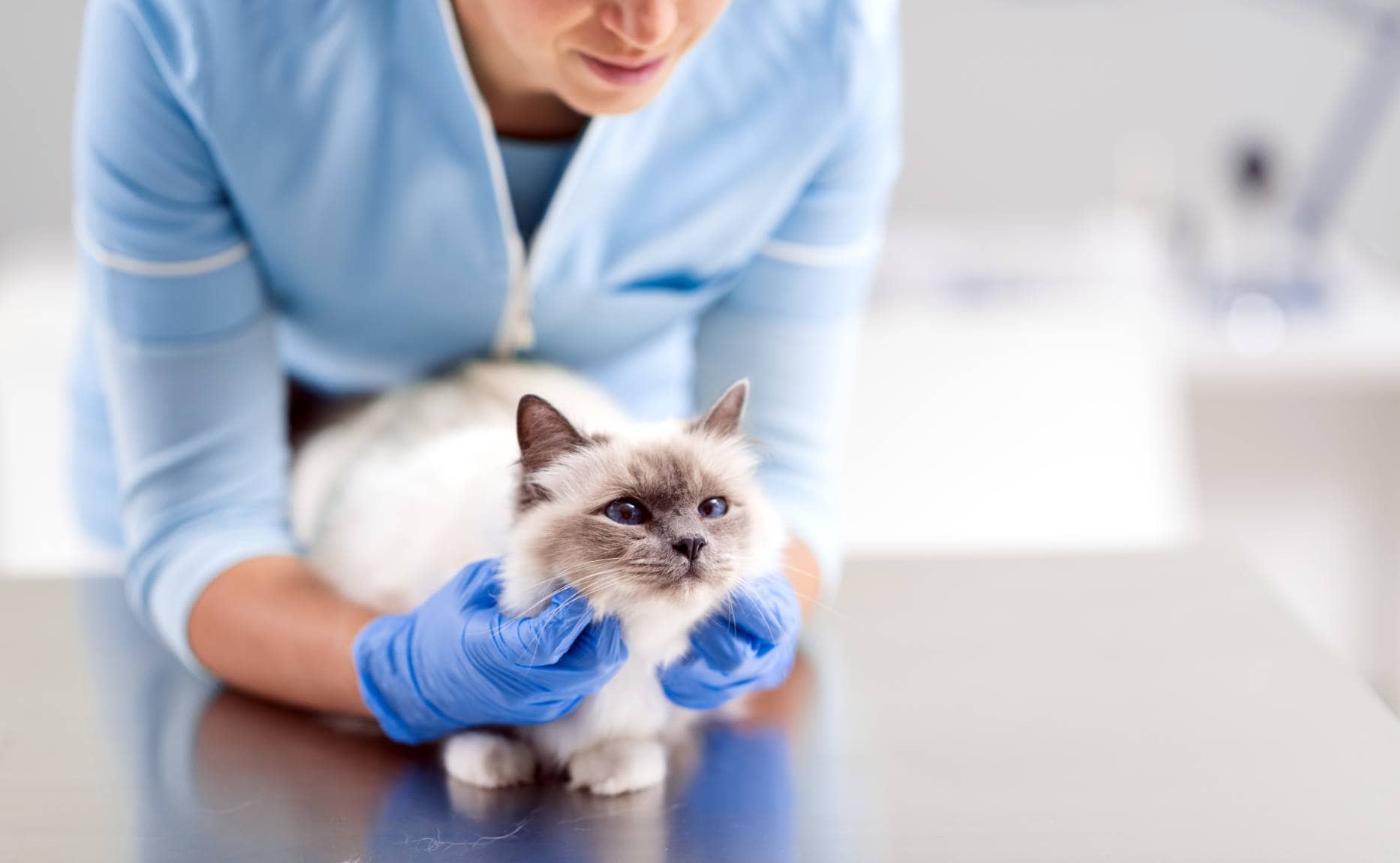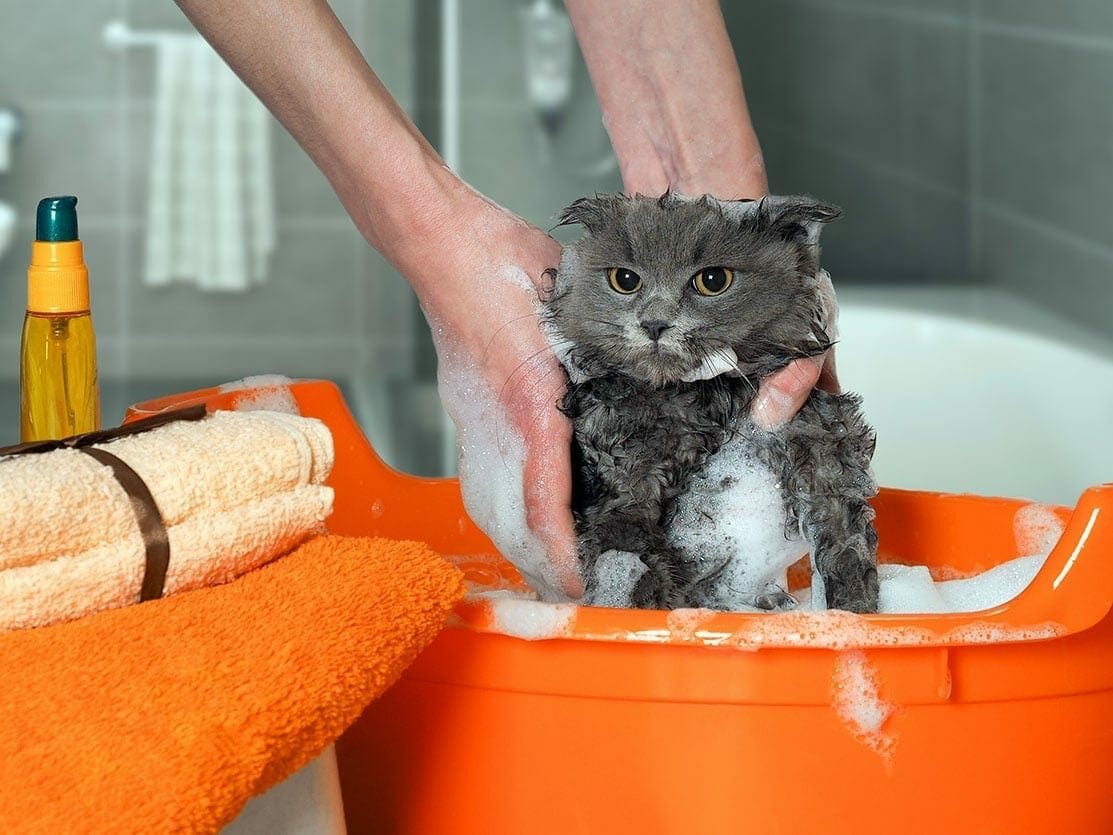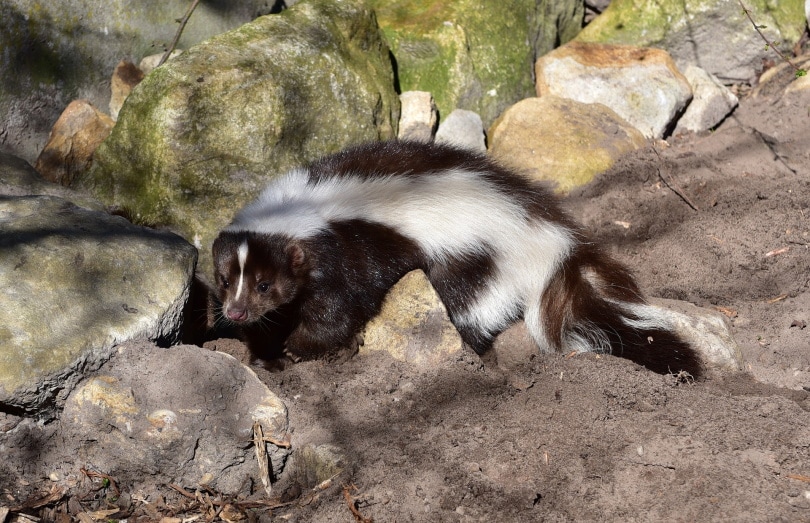
If you’ve ever been on a backroad late at night, you’ve probably smelled the unmistakable scent of a skunk. The pungent odor overtakes everything in its path. Unfortunately, your cat might be in that path sometimes. If you live in an area where skunks are endemic, it’s a good idea to know what to do if your cat gets skunked. Even if your cat is fully indoor, there’s always a chance that they’ll slip out an open door or window, so it’s best to be prepared. Here’s what to do if your cat has been sprayed by a skunk.
Give Your Cat a Thorough Exam

If your cat saunters in smelling like a skunk, the first thing you need to do is give your cat a thorough check over. This is unpleasant due to the stench, and it’s a good idea to wear thick gloves to keep the smell off of your hands. Skunks are generally harmless, peaceful animals. Since their scent is their primary form of protection, they rarely need to do more. However, skunks do have claws and teeth, and they know how to use them. If your cat has been skunked, you need to check it over thoroughly to ensure there are no bites or scratches.
Beware of Infections
Sometimes, bites and scratches can be difficult to spot on our furry friends, so it’s important to keep an eye on things for a few days after the skunk incident. It’s possible for these wounds to become infected and form abscesses or systemic infections. It’s also possible for a skunk to transmit rabies to your cat via a bite or scratch.
Rabies in Skunks
Skunks are one of the primary carriers of rabies in North America, so there is always a chance that a wild skunk you encounter may have rabies. Typically, the best course of action is to leave the skunk alone and give it space. If your cat has been in contact with a skunk, though, then you need to talk to your vet. They may want to see your cat for a checkup, especially if your cat is not current on its rabies vaccine. Rabies is an extremely deadly virus that is transmissible to humans, so it’s important to keep your cat up to date on its rabies vaccine, even if it’s a fully indoor cat. Rabies vaccines should only be administered by a veterinarian so you can be sure the vaccine is stored and administered properly.
Talk to Your Vet

Not only can skunk spray be irritating to the eyes and mucus membranes, it has caustic properties, which means it can actually burn the skin. If inhaled, it can leave burns in the airway and lungs, so it’s important to talk to your vet if you suspect your cat may be having any respiratory changes after a skunk encounter. The other serious issue that skunk spray can lead to is anemia. This is a rare side effect of exposure to skunk spray, but it does occur in both cats and dogs. This anemia can lead to difficulty breathing, lethargy, and loss of appetite. If you notice these symptoms or notice that your cat’s gums begin to look pale within days of the skunk exposure, then you need to talk to your vet and they will likely want to see your cat for a full exam.
 Time for a Bath
Time for a Bath

There are all kinds of things you can try to remove skunk smell, but the primary purpose of all of them is to neutralize the smell. You may hear people recommend dousing your cat in tomato juice, but this old standby is not effective at removing the skunk smell. It tends to do little more than mask the smell, leaving your cat smelling like a tomato-flavored skunk.
Cat Bathing Tips
Why Do Skunks Stink?
Like dogs and cats, skunks have anal glands. These glands are small sacs located on either side of the interior of the rectum. In dogs and cats, you may notice a fishy smell if they express their anal glands. Skunks, on the other hand, excrete an oily substance that contains thiols, which are sulfuric compounds that also account for the rotten egg smell associated with sulfur. The oiliness of the spray makes it difficult to clean off, which means that an animal that has been sprayed in the face may have a difficult time getting rid of the smell on its own. It can also lead to irritation of the eyes and mucus membranes.

How to Avoid Skunks
Skunks are primarily crepuscular, which means they are most active at dawn and dusk. They are also nocturnal, so they will be out and about throughout much of the nighttime hours, but you are most likely to have a skunk encounter at dawn or dusk. Keeping your cat indoors is the best way to avoid interactions with skunks. If your cat does go outside, it’s best to only allow your cat outside during daylight hours.
Although you are most likely to encounter a skunk outside of daylight hours, a skunk interaction is sometimes unavoidable. Sick, injured, and orphaned skunks may be out during the daytime. If you spot a skunk out during the daytime, you should contact your local animal control or game and fish commission so they can capture and evaluate the skunk and ensure it doesn’t need assistance.
In Conclusion
Avoiding skunks and keeping your cat indoors is the best way to avoid skunk interactions. However, it’s good practice to be prepared just in case a skunk incident does occur. Cats are naturally curious and some may even see a skunk as a threat, so it’s not uncommon for cats to be skunked, although it does occur less commonly in cats than it does in dogs. When it comes to removing the skunk smell from your cat, your best resource will always be your veterinarian. Commercial skunk odor removers are a great option, but when that isn’t available, you can make your own mixture at home with simple ingredients you can pick up at the drug store.
- Next on your reading list: Dog Sprayed by Skunk? Here’s What to Do (Vet Approved)
Featured Image Credit: Geoffrey Kuchera, Shutterstock






